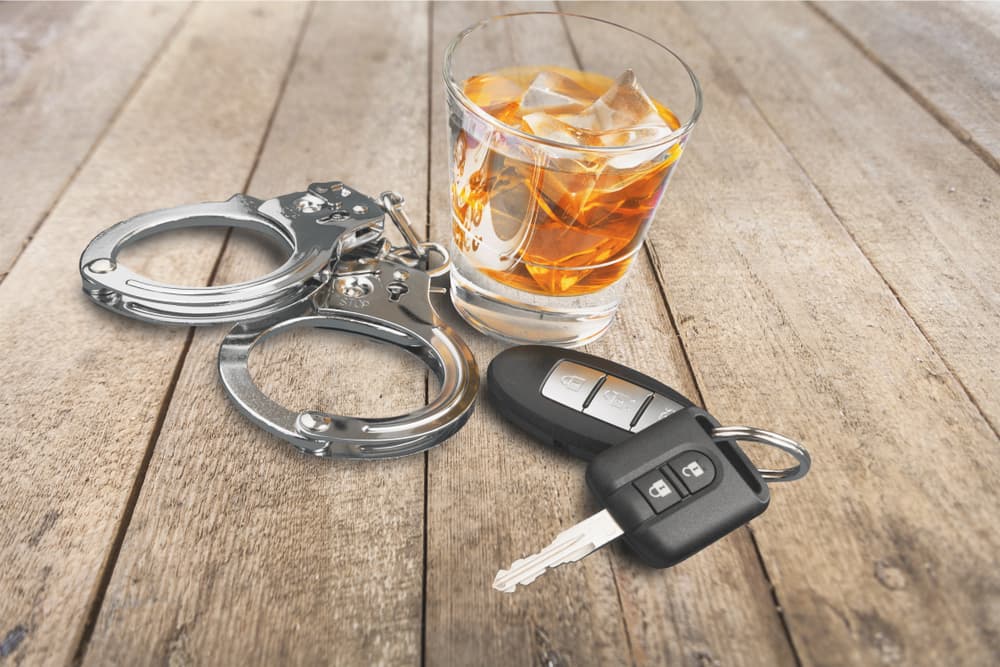What is the Sentence for DUI Manslaughter in L.A.?

Driving under the influence of alcohol or drugs already carries serious consequences, but when it leads to a fatality, the stakes are exponentially higher.
In Los Angeles, a DUI that results in someone’s death could lead to a charge of DUI manslaughter, a severe offense with potential penalties ranging from a few years in prison to a lifetime behind bars. California’s strict vehicular manslaughter laws leave no room for leniency, especially when gross negligence is involved, and the possible penalties reflect the gravity of the crime.
In this guide, we’ll dive into the sentencing specifics for DUI manslaughter in Los Angeles, covering the distinctions between different levels of charges and the potential consequences for each.
If you’re confronting DUI manslaughter charges, or if you’re trying to figure out California’s complex vehicular manslaughter laws, now is the time to seek legal guidance. Connect with our team today (213) 995-6767 to discuss your case and explore your options.
Types of DUI Manslaughter Charges in California
 When it comes to DUI manslaughter in Los Angeles, the law recognizes two distinct types of charges: Gross Vehicular Manslaughter While Intoxicated and Vehicular Manslaughter While Intoxicated. Each carries its own set of legal consequences and reflects different levels of culpability, as we will discuss in the following section.
When it comes to DUI manslaughter in Los Angeles, the law recognizes two distinct types of charges: Gross Vehicular Manslaughter While Intoxicated and Vehicular Manslaughter While Intoxicated. Each carries its own set of legal consequences and reflects different levels of culpability, as we will discuss in the following section.
Why the Distinction Matters
The primary difference between these charges lies in the level of negligence attributed to the driver’s actions, which in turn influences sentencing. Knowing whether a case involves gross or ordinary negligence is vital for anyone facing these charges, as it directly impacts not only the potential length of incarceration but also the additional consequences, such as fines, probation terms, and long-term criminal records.
In either scenario, Los Angeles County’s legal system handles these cases with a heavy hand. California’s commitment to enforcing these laws, especially in high-traffic urban areas like Downtown LA or along notorious routes such as Sunset Boulevard, underscores the importance of understanding the ramifications and nuances of each charge.
Penalties for Gross Vehicular Manslaughter While Intoxicated
Gross vehicular manslaughter is always a felony under California Penal Code Section 191.5(a). The charges stem from driving under the influence and displaying gross negligence, such as excessive speeding on local freeways like the 101 or 110, or driving recklessly through busy intersections like those on Wilshire Boulevard.
Here’s a breakdown of the consequences you might face if convicted of this charge:
Prison Sentence
- Standard Sentencing: For a first-time offender, the prison sentence can range from 4, 6, or 10 years in state prison. The exact length often depends on the specifics of the case, including any aggravating factors, such as extreme intoxication levels or dangerous driving behaviors.
- Enhanced Sentencing: If you have prior DUI convictions, California law allows for enhanced sentencing. Under the “Watson Advisement” rule, a repeat offender may face 15 years to life in prison if previously warned about the dangers of DUI and then reoffending. This harsher penalty reflects the court’s perception of the offense as more than an accident—the courts will treat it as a preventable and knowing risk.
Financial Penalties
- Fines: Convictions for gross vehicular manslaughter while intoxicated can also carry substantial fines, with amounts reaching up to $10,000. This financial burden is often coupled with restitution payments to the victim’s family, further compounding the cost of the offense.
Other Legal Consequences
- License Suspension: In addition to prison time and fines, a conviction results in a mandatory driver’s license suspension for at least three years, enforced by the California Department of Motor Vehicles (DMV). If you’re caught driving during this suspension, you risk additional criminal charges and further penalties.
- Three Strikes Law: A conviction for gross vehicular manslaughter while intoxicated counts as a “strike” under California’s Three Strikes Law. This law significantly increases penalties for any subsequent felony convictions, which can include doubling the prison sentence or even leading to life imprisonment on a third strike.
Gross vehicular manslaughter while intoxicated is one of California’s most heavily penalized DUI offenses. Given the life-altering consequences of a conviction, we cannot overstate the importance of mounting a strong defense.
Penalties for Vehicular Manslaughter While Intoxicated (Without Gross Negligence)

Vehicular manslaughter while intoxicated, when charged without gross negligence under California Penal Code Section 191.5(b), carries less severe penalties than the gross negligence equivalent. However, it still involves considerable consequences, as California law treats any DUI-related fatality with the utmost gravity.
This offense is often referred to as a “wobbler,” which means it can be prosecuted as either a misdemeanor or a felony, depending on the case specifics.
Here’s what you need to know:
Misdemeanor Charges
When the charge is a misdemeanor, the consequences are generally lighter but still impactful:
- Jail Time: A misdemeanor conviction can result in up to one year in county jail. Though less severe than prison, a year in jail can still significantly disrupt one’s life, affecting employment and personal relationships.
- Fines: Misdemeanor fines for vehicular manslaughter while intoxicated can reach up to $1,000, a substantial amount that can also accompany other court fees and additional financial penalties associated with probation requirements.
Felony Charges
If the offense is a felony, the potential penalties increase substantially:
- Prison Sentence: A felony conviction carries a possible state prison sentence of 16 months, 2 years, or 4 years. The decision on the exact sentence typically depends on the presence of aggravating factors, such as whether the defendant had prior DUI offenses or a particularly high blood alcohol concentration (BAC) at the time.
- Fines: Felony fines can be as high as $10,000, similar to the fines associated with gross vehicular manslaughter while intoxicated. This sum may also include additional fees to cover court costs and victim restitution payments.
Additional Penalties and Probation
Aside from potential incarceration and fines, a felony conviction for vehicular manslaughter while intoxicated often leads to:
- Formal Probation: With formal (felony) probation, individuals are subject to regular reporting requirements and supervision by a probation officer, as well as other court-mandated conditions like attending DUI education programs.
- License Suspension: Convicted individuals will also face a mandatory suspension of their driver’s license, typically for a minimum period of one year. Reinstatement usually requires fulfilling DMV requirements, which may include the installation of an ignition interlock device (IID).
While penalties under Penal Code 191.5(b) are less severe than those for gross vehicular manslaughter, they remain life-changing. A felony on your record can impact future employment opportunities, lead to a prolonged loss of driving privileges, and significantly affect personal relationships.
Additional Legal and Financial Consequences
Beyond jail time, fines, and probation, a DUI manslaughter conviction can lead to various long-term legal and financial impacts that may extend far beyond the courtroom.
Ignition Interlock Devices (IID)
- Ignition Interlock Device (IID): Upon eligibility for license reinstatement, many convicted individuals will be required to install an IID in their vehicle. This device prevents the vehicle from starting unless the driver provides a breath sample free of alcohol. Costs associated with installing and maintaining an IID can be burdensome, adding to the financial strain of a conviction.
Restitution and Civil Liability
- Restitution to the Victim’s Family: California law often requires individuals convicted of DUI manslaughter to pay restitution to the family of the deceased. This payment helps compensate for the financial losses related to the victim’s death, such as funeral expenses and lost income. Restitution payments are separate from fines and can add a significant financial burden.
- Civil Lawsuits: In addition to criminal penalties, the family of the deceased may file a wrongful death lawsuit against the convicted driver. This civil action seeks compensation for emotional distress, loss of companionship, and other damages not covered by restitution. Civil cases often result in substantial financial judgments, which legal fees and prolonged court proceedings can further compound.
Insurance and Employment Impact
- Increased Insurance Premiums: A DUI manslaughter conviction typically leads to drastically higher auto insurance premiums. Many insurers may even refuse to renew policies for individuals with such serious convictions, requiring them to seek coverage through high-risk insurance providers, which comes with much higher costs.
- Professional Repercussions: Beyond direct legal and financial penalties, a felony DUI manslaughter conviction can significantly impact one’s professional life. Many employers conduct background checks, and a felony conviction can limit job opportunities, particularly in fields requiring security clearances, professional licenses, or commercial driving privileges.
Defenses Against DUI Manslaughter Charges
When facing DUI manslaughter charges, exploring viable defense strategies can make a substantial difference in the case’s outcome. California law allows defendants to contest these charges on multiple grounds, especially when it comes to proving elements like intoxication, negligence, and causation.
Here are some of the most common defense strategies for DUI manslaughter charges in Los Angeles:
Challenging Intoxication Evidence
- Breath and Blood Test Accuracy: Defense attorneys often scrutinize the validity of breathalyzer or blood test results. These tests are subject to strict regulatory standards, and any procedural errors—such as improper calibration or handling—can cast doubt on their accuracy. If you’re charged based on potentially flawed results, your defense might argue that the test did not accurately reflect your blood alcohol concentration (BAC) at the time of the accident.
- Alternative Explanations for Apparent Intoxication: Symptoms associated with intoxication, such as slurred speech or unsteady movement, can sometimes be attributed to other factors like fatigue, shock, or medical conditions. Demonstrating that your behavior was consistent with something other than intoxication could weaken the prosecution’s case.
Disputing Negligence
- Ordinary vs. Gross Negligence: In gross vehicular manslaughter cases, the prosecution must prove that your actions amounted to gross negligence, which involves a reckless disregard for human life. A defense attorney might argue that, while you acted with ordinary negligence, you did not display the level of recklessness required for a gross negligence conviction. If successful, this could reduce the charge to a lesser offense, which carries lighter penalties.
- Acting Reasonably Under Emergency Conditions: California law recognizes that emergencies sometimes require quick decisions. If your actions were a reasonable response to an unexpected hazard—like swerving to avoid a pedestrian or an animal—you might be able to argue that you were not negligent, or at least not grossly so. This defense could potentially reduce or even eliminate charges.
Questioning Causation
- Proving an Alternative Cause of Death: In DUI manslaughter cases, the prosecution must establish a direct link between your actions and the victim’s death. If other factors—such as poor road conditions, weather, or even the actions of the victim or other drivers—contributed to the fatal outcome, your defense may argue that you were not solely responsible. Utilizing accident reconstruction experts to provide evidence can be crucial in demonstrating an alternative causation.
- Mechanical Failure or External Factors: A defense could argue that a mechanical issue with your vehicle, such as brake failure, or another external factor beyond your control contributed to the accident. In some cases, proving such factors existed can significantly impact the charges and potential penalties.
Each DUI manslaughter case is unique, and the right defense strategy will depend on the specific facts and circumstances.
Secure Your Future With The Rodriguez Law Group Today
 Facing DUI manslaughter charges is a life-altering experience, with the potential for harsh penalties that could include years behind bars, hefty fines, and severe personal consequences.
Facing DUI manslaughter charges is a life-altering experience, with the potential for harsh penalties that could include years behind bars, hefty fines, and severe personal consequences.
Let The Rodriguez Law Group stand by your side. With knowledgeable and dedicated attorneys who understand the complexities of Los Angeles law, our team is prepared to fight tirelessly on your behalf.
Contact us today (213) 995-6767 for a free consultation.


